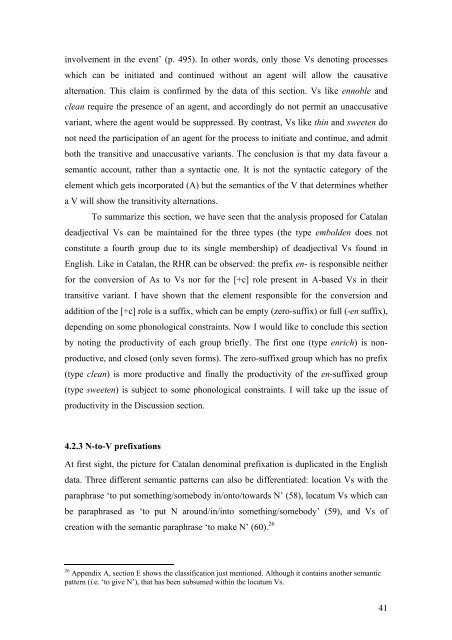Prefixation in English and Catalan - Departament de Filologia ...
Prefixation in English and Catalan - Departament de Filologia ...
Prefixation in English and Catalan - Departament de Filologia ...
Create successful ePaper yourself
Turn your PDF publications into a flip-book with our unique Google optimized e-Paper software.
<strong>in</strong>volvement <strong>in</strong> the event’ (p. 495). In other words, only those Vs <strong>de</strong>not<strong>in</strong>g processes<br />
which can be <strong>in</strong>itiated <strong>and</strong> cont<strong>in</strong>ued without an agent will allow the causative<br />
alternation. This claim is confirmed by the data of this section. Vs like ennoble <strong>and</strong><br />
clean require the presence of an agent, <strong>and</strong> accord<strong>in</strong>gly do not permit an unaccusative<br />
variant, where the agent would be suppressed. By contrast, Vs like th<strong>in</strong> <strong>and</strong> sweeten do<br />
not need the participation of an agent for the process to <strong>in</strong>itiate <strong>and</strong> cont<strong>in</strong>ue, <strong>and</strong> admit<br />
both the transitive <strong>and</strong> unaccusative variants. The conclusion is that my data favour a<br />
semantic account, rather than a syntactic one. It is not the syntactic category of the<br />
element which gets <strong>in</strong>corporated (A) but the semantics of the V that <strong>de</strong>term<strong>in</strong>es whether<br />
a V will show the transitivity alternations.<br />
To summarize this section, we have seen that the analysis proposed for <strong>Catalan</strong><br />
<strong>de</strong>adjectival Vs can be ma<strong>in</strong>ta<strong>in</strong>ed for the three types (the type embol<strong>de</strong>n does not<br />
constitute a fourth group due to its s<strong>in</strong>gle membership) of <strong>de</strong>adjectival Vs found <strong>in</strong><br />
<strong>English</strong>. Like <strong>in</strong> <strong>Catalan</strong>, the RHR can be observed: the prefix en- is responsible neither<br />
for the conversion of As to Vs nor for the [+c] role present <strong>in</strong> A-based Vs <strong>in</strong> their<br />
transitive variant. I have shown that the element responsible for the conversion <strong>and</strong><br />
addition of the [+c] role is a suffix, which can be empty (zero-suffix) or full (-en suffix),<br />
<strong>de</strong>pend<strong>in</strong>g on some phonological constra<strong>in</strong>ts. Now I would like to conclu<strong>de</strong> this section<br />
by not<strong>in</strong>g the productivity of each group briefly. The first one (type enrich) is nonproductive,<br />
<strong>and</strong> closed (only seven forms). The zero-suffixed group which has no prefix<br />
(type clean) is more productive <strong>and</strong> f<strong>in</strong>ally the productivity of the en-suffixed group<br />
(type sweeten) is subject to some phonological constra<strong>in</strong>ts. I will take up the issue of<br />
productivity <strong>in</strong> the Discussion section.<br />
4.2.3 N-to-V prefixations<br />
At first sight, the picture for <strong>Catalan</strong> <strong>de</strong>nom<strong>in</strong>al prefixation is duplicated <strong>in</strong> the <strong>English</strong><br />
data. Three different semantic patterns can also be differentiated: location Vs with the<br />
paraphrase ‘to put someth<strong>in</strong>g/somebody <strong>in</strong>/onto/towards N’ (58), locatum Vs which can<br />
be paraphrased as ‘to put N around/<strong>in</strong>/<strong>in</strong>to someth<strong>in</strong>g/somebody’ (59), <strong>and</strong> Vs of<br />
creation with the semantic paraphrase ‘to make N’ (60). 26<br />
26 Appendix A, section E shows the classification just mentioned. Although it conta<strong>in</strong>s another semantic<br />
pattern (i.e. ‘to give N’), that has been subsumed with<strong>in</strong> the locatum Vs.<br />
41
















